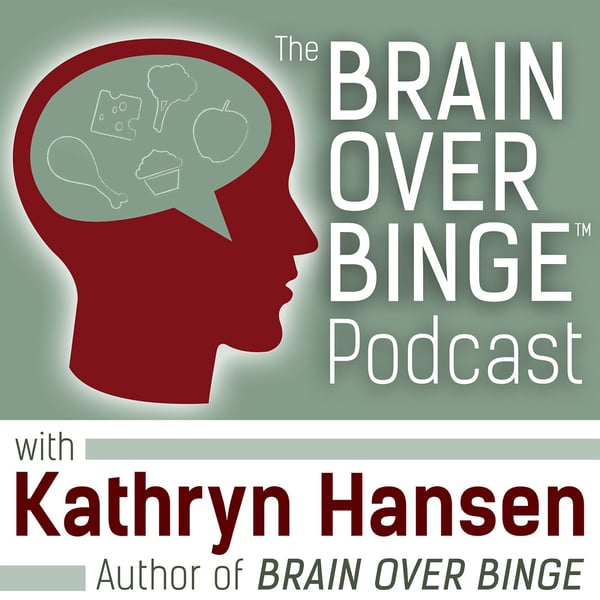Ep. 36: Q&A: Physical Consequences of Binge Eating
Brain over Binge Podcast
Kathryn Hansen
4.6 • 785 Ratings
🗓️ 13 February 2018
⏱️ 22 minutes
🧾️ Download transcript
Summary
In Episode 36, Kathryn answers a question about the potential physical effects of eating large volumes of food, especially late at night. The primary goal of this discussion is to give you new ways to think about physical consequences (not to provide medical advice).
Subscribe to the Brain over Binge Course for only $18.99 per month
Get personalized support with one-on-one coaching or group coaching
Get Brain over Binge and the Brain over Binge Recovery Guide on Amazon
Disclaimer: *The Brain over Binge Podcast is produced and recorded by Brain over Binge Recovery Coaching, LLC. All work is copyrighted by Brain over Binge Recovery Coaching, LLC, and all rights are reserved. As a disclaimer, the hosts of the Brain over Binge Podcast are not professional counselors or licensed healthcare providers, and this podcast is not a substitute for medical advice or any form of professional therapy. Eating disorders can have serious health consequences and you are strongly advised to seek medical attention for matters relating to your health. Please get help when you need it, and good luck on your journey.
Transcript
Click on a timestamp to play from that location
| 0:00.0 | If you ever feel out of control around food, you're not alone, and you're in the right place to learn practical, no-nonsense information about why you binge and how to stop. |
| 0:12.4 | Binge eating does not mean that something is wrong with you. It's a natural but primitive brain response that you can correct. |
| 0:19.9 | If you're ready for change, sign up for the |
| 0:22.3 | Brain Over Binge self-paced online course for less than $20 per month. And if you feel you need |
| 0:28.2 | personalized support, we also offer one-on-one coaching and group coaching. To learn more, go to |
| 0:34.6 | brainoverbinge.com forward slash subscribe. |
| 0:38.3 | And I hope you enjoy the show. |
| 0:45.6 | Welcome to the Brain OverBinge Podcast, where you learn a simple, brain-based approach to ending binge eating. |
| 0:51.1 | Today is the second Q&A podcast, and I want to thank everyone who has submitted |
| 0:55.5 | questions to me. I hope that these episodes help you troubleshoot any issues that you may be |
| 1:00.5 | facing in recovery. I hope you can gain some valuable insights that you can apply right away, |
| 1:05.8 | or just that these episodes spark some ideas for you, because really it's your own insights |
| 1:10.6 | that are going to help you |
| 1:11.6 | the most. For today's show, I'm going to discuss one question that was submitted to me by James. On the |
| 1:18.0 | surface, it might seem like a simple answer might work, but I think that a deeper discussion is really |
| 1:23.5 | necessary here. Here's the question from James. He says, if there was a little more data |
| 1:28.5 | explaining the stress that one puts on the physical body, the heart, the kidneys, liver, |
| 1:33.6 | intestines, and digestion from eating large volumes of food, it would be another chip in favor of |
| 1:40.2 | not binging late at night. I find the physical hard truths help me in the moments of temptation. |
| 1:46.9 | There's already so much information surrounding the harmful effects of additives, sugar, |
| 1:51.3 | pesticides, and artificial foods, but very little that focuses solely on volume processing, |
| 1:57.1 | or food volume. James gave an example of what he'd like to know in sort of a fill-in-the-blanks |
... |
Please login to see the full transcript.
Disclaimer: The podcast and artwork embedded on this page are from Kathryn Hansen, and are the property of its owner and not affiliated with or endorsed by Tapesearch.
Generated transcripts are the property of Kathryn Hansen and are distributed freely under the Fair Use doctrine. Transcripts generated by Tapesearch are not guaranteed to be accurate.
Copyright © Tapesearch 2025.

